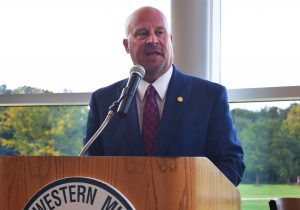Michigan doesn’t have an “unemployment problem”, it has a “shrinking workforce problem”. That’s the assessment today from a former Michigan budget director and three-term state representative. Al Pscholka is now an executive with Kinexus, the regional agency that oversees job service and training in Southwest Michigan—helping bring employers and potential workers together.
Pscholka and Michigan Works Executive Director Lily Brewer met with reporters today to talk about the growing crisis surrounding employment in Michigan. Pscholka says there’s a “smaller labor market” because there’s a “labor force disengagement.”
“Some workers are leaving, some are not coming back, but either way, they’re gone” says Pscholka. In Southwest Michigan’s three-county area, that means there are at least 4,200 less workers looking for jobs than before the pandemic. That makes for particularly tough times for employers in three key economic sectors: Leisure & Hospitality, Health Care and Manufacturing.
Pscholka says the situation is complicated—not as simple as too generous unemployment benefits doled out during the pandemic. Those benefits end in early September. But he says that doesn’t mean idled workers will be lining up to apply for jobs.

In the Hospitality sector, for example, Pscholka points to a recent survey that shows seven in ten former hospitality workers are NOT coming back. They’re finished with that industry and look forward to trying something else, if and when they are ready to return to work. 38 percent of current hospitality workers also said they’d rather be in a different industry. They blamed the treatment they receive from customers—not their employers—for that lack of enthusiasm. The hospitality situation has been playing out in shortened hours and more ‘closed’ days in Southwest Michigan bars and restaurants in recent weeks, despite being in the middle of the tourist season.
“Burnout” Pscholka calls it. And backs it up with a national survey across all job sectors that found more than one-third of the labor force is looking to change jobs, perhaps move to a different industry.
What about new incentives that are being offered by many employers to attract or retain employees? Lily Brewer, Executive Director of Michigan Works says that so far, they’re not working. “They’re trying all forms of bonuses, but none seem to be working.”
Scanning other major sectors, Pscholka said Southwest Michigan’s Manufacturing work force is down nearly ten percent from pre-pandemic: 1,700 fewer workers on the production lines. Health Care is down 6-7 percent, with “burnout” amid the pandemic’s demands cited as the reason. Agri-Business jobs, a Southwest Michigan trademark, are down over ten percen in the past year.
Looking for a positive spin on the situation, both Pscholka and Brewer say it’s a “great time to be looking for job.” Or especially to be starting a career as a young worker.
Employers are willing to pay more to start, and to train up workers because their experienced ranks are being depleted. Brewer points out that there are $15 per hour jobs out there that no one imagined two years ago. Incentives are being offered to start, with more incentives offered to stay in a position beyond a certain period of time. And employers are more willing than ever to pay for training employees who need special skills. Seventeen and 18 year olds are being considered for positions they might never have been in the past.
If the Work Force issues can be solved over time, Pscholka also sees another ‘dark cloud’ on the economic horizon. Small businesses have benefitted from two rounds of ‘PPP Loans’. It’s unlikely there will be a third. These loans, most of which turned into subsidy/grants to private businesses, kept many businesses open. Without them, some would have failed and closed their doors.
In 2022, Pscholka points out, these businesses will be on their own. With higher prices, supply chain issues and work force challenges, will they be able to survive and prosper? Stay tuned!






